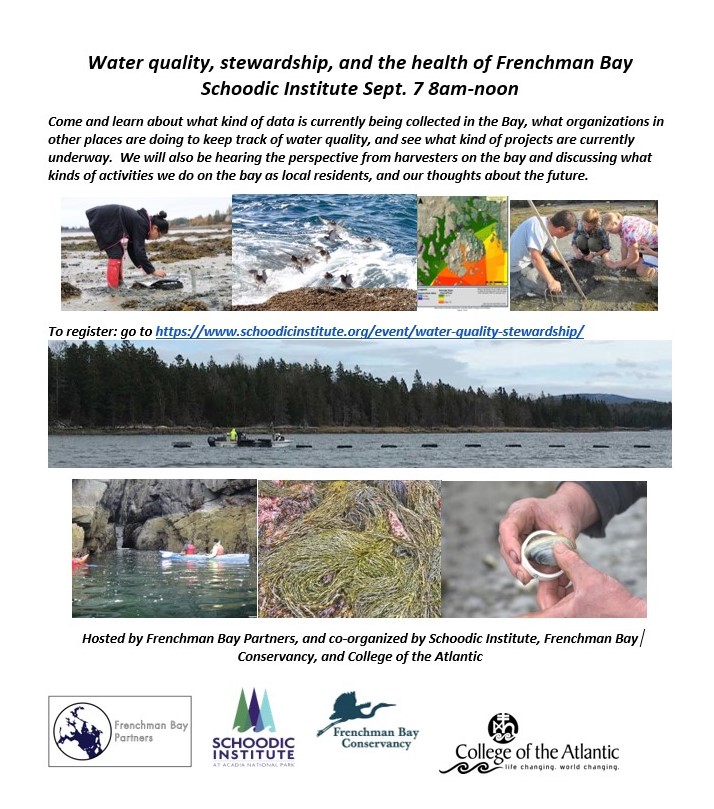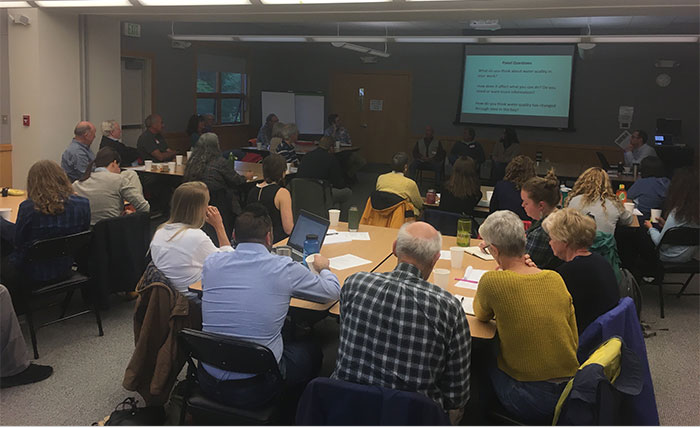Water quality, stewardship, and the health of Frenchman Bay
On September 7th of 2019, the “Water quality, stewardship, and the health of Frenchman Bay” event was hosted by Frenchman Bay Partners and co-organized by Schoodic Institute, Frenchman Bay Conservancy, and College of the Atlantic. This public-event was designed to share what kind of data collection is in the Bay, which organizations are collecting data, and what projects these organizations are working on. This event brought the voices of various stakeholders to the table, where perspectives from local residents, academics, and harvesters were heard from. Before the event, participants were asked to fill out a survey about their relationship and experiences with the Bay as well as their views of the Bay’s health. A total of 41 people attended the half-day meeting at the Schoodic Institute.
Below is a picture of the flyer for the meeting, and after that the agenda for the meeting with links to details on each talk or session.

Event Agenda
8:00 – 8:30 Arrive & Map Exercise & Pre-Arrival Survey Upon arrival participants were asked to identify areas in Frenchman Bay where they enjoy, recreate, care for, work in, or have observations about.
8:30 – 9:30 Session 1 — Water Quality & Action. This segment was a series of talks about different projects and steps taken to better the water quality in and around Frenchman Bay. The title of each talk is linked to a short summary as well as some selected slides and descriptions from each of the talks.
What we know about water quality in Frenchman Bay
Giulia Cardoso and Chris Petersen, College of the Atlantic
Eastern Bay Watershed-Based Management Plan
Zack Steele, Hancock County Soil and Water Conservation District
Developing a Water-Sampling Program: Example from the Kennebec Estuary
Ruth Indrick, Kennebec Estuary Land Trust (KELT)
Harmful Algal Blooms and Citizen Monitoring
Barry King, Maine Department of Marine Resources
9:30 – 9:50 Map Exercise & Coffee Break
Participants continued to identify areas of Frenchman Bay that they enjoy, recreate in, work in, care for or have observations about.
9:50 – 10:40 Session 2 – Perspectives of harvesters that work in Frenchman Bay
A panel of both wild and aquaculture harvesters in Frenchman Bay talked about their work and perspectives of the bay. The panel included Shep Erhart – Maine Sea Coast Vegetables, Sarah Redmond – Springtide Seaweeds, and Joe Porada – Frenchman Bay Regional Shellfish Committee. Sarah, Shep, and Joe talked about their experiences in Frenchman Bay, which ranged from a few years to several decades in the case of Shep. They were pleased with the monitoring that has gone on in the bay, and emphasized the need to see the ocean as a shared public resource. They also shared their concerns about global climate change, water quality, and invasive species.
10:50 – 11:30 Session 3 — Break-out Groups
Participants were split into groups to discuss the talks and key themes listed below. Notes from each break-out group can be found linked to the titles. We led off the conversation with two over-arching questions:
What additional information do you think we (collectively) need to be able to understand the role of X (below) in Frenchman Bay health, now and in the future?
What sustainable stewardship opportunities would you think people around Frenchman Bay could contribute to?
A summary of the points raised can be found here: Cruise Ships, Harmful Algal Blooms (HAB) & Invasives, Upper Bay Issues, and Nutrient Levels
11:30 – 11:50 Closing Remarks
We hope that this conversation will lead to more communication and action moving ahead. Generally, the historical work in Frenchman Bay suggests that despite increasing development and tourism, especially from cruise ships, that the water quality seems to be quite good, and in terms of some things like shellfish harvesting, shoreline pollution seems to have decreased substantially over time. Although there is a concern about nutrient pollution (eg. nitrogen, phosphorus) and new and different types of toxic algal blooms as we move forward, currently the summer levels of nutrients are extremely low. As the use of the bay continues, there is always the question about when there will be ‘too much’ of something, whether it is cruise ships, shoreline development, or aquaculture or any other activity. Moving forward, individuals talked about how we could do more effective monitoring of both water quality and species in our bay, but no specific plans came out of the meeting.
